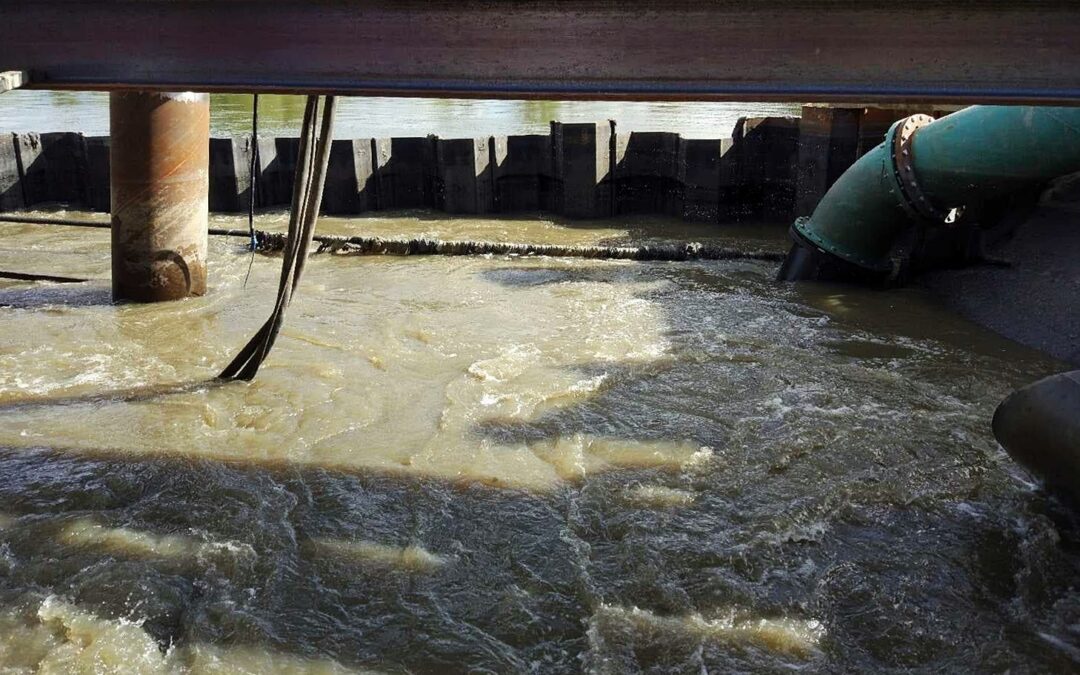A technical failure at a treatment plant in Warsaw on Saturday has – for the second time in a year – begun sending millions of litres of sewage into the Vistula river.
After the leak began on Saturday, raw sewage began flowing into the river at a rate of 3,000 cubic metres per second. This increased to 15-20,000 cubic metres per second by Monday morning, following heavy rainfall.
Last year’s malfunction likewise initially saw a flow of three cubic metres per second. Within a week, 1.5 billion litres of sewage had ended up in the Vistula, reports Polsat News. The leak was not finally stemmed until 18 days after it began.
Dziś, w rok po awarii kolektora ściekowego, w warszawskiej oczyszczalni ścieków #Czajka, doszło do kolejnego…
Opublikowany przez Wody Polskie Sobota, 29 sierpnia 2020
A section of pipes around 1km long may now need to be replaced. In the meantime, the city is considering alternative routes to transfer the sewage from the left bank of the river to the right bank, where the treatment plant is located.
This could take the form of a temporary pipe on the bottom of the Vistula, or transmission via the Northern Bridge.
On Monday morning, the wave of sewage in the river reached the city of Płock, around 100km downstream from Warsaw. It will soon arrive at the northern city of Toruń.
Poland’s state water management body, Wody Polskie, cautioned against swimming and fishing in the Vistula river, and asked farmers to refrain from using its water for crops or animals.
However, tap water in Warsaw itself, which is taken from further upstream, remains unaffected by the leak.
Bez względu na awarię układu przesyłowego zapewniamy – #WarszawskaKranówka jest bezpieczna! Ścieki awaryjnie zrzucane do Wisły są ozonowane, a ujęcia wody znajdują się 10 km powyżej tego miejsca. Pracujemy nad ustaleniem przyczyn awarii i przywróceniem sprawnego działania systemu pic.twitter.com/ZxQFeXb9hU
— Warszawa (@warszawa) August 30, 2020
Like last year’s leak, the situation has become a political as well as an ecological crisis. Warsaw mayor Rafał Trzaskowski – who recently stood as the opposition presidential candidate for the centrist Civic Platform (PO) – has been accused from both left and right of being responsible for the disaster.
“The city authorities have been unable to prevent another failure,” said Michał Dworczyk, the head of conservative Prime Minister Mateusz Morawiecki’s office.
“Wody Polskie had warned Warsaw about a possible failure already a year ago,” added Dworczyk. “Unfortunately, the recommendations were not taken into account.”
The minister of marine economy and inland navigation, Marek Gróbarczyk, promised to notify prosecutors of Trzaskowski’s alleged neglect, saying that the mayor must “take full responsibility for the contamination of the river”.
Krzysztof Gawkowski, the head of the Left’s parliamentary caucus, likewise called on Trzaskowski to “apologise and take responsibility”. Even if he cannot be blamed personally, one of his officials must be at fault, Gawkowski told Onet, noting that PO has ruled Warsaw for 14 years.
Mamy powtórkę sprzed roku i kolejną katastrofalną awarię #Czajka. Warszawskie fekalia znów płyną Wisłą.
Trzaskowski nie zastosował się do zaleceń @MGMiZS_GOV_PL, nie wykonał rurociągu awaryjnego. Ponosi pełną odpowiedzialność za skażenie Wisły. Skierujemy sprawę do prokuratury.— Marek Gróbarczyk (@marekgrobarczyk) August 29, 2020
In response, Trzaskowski said that he had “not disregarded the failure” that took place last year. He noted that plans for a new system had already been in place since last November.
“Preparatory work for the construction of a new sewage transfer system is underway,” he said, noting that a tender for the construction is expected in coming weeks, reports Gazeta Wyborcza.
Following last year’s leak, a 100-metre section of the pipeline was replaced. According to Trzaskowski, regular checks were conducted, with the most recent one taking place last Wednesday.
The mayor’s office has blamed the leak on “systemic failures”, claiming that mistakes were made at early stage of construction in 1999 and 2005. This included the decision to not build a sewage treatment plant on the left bank of the Vistula, as well as other “serious” project errors.
Before 2006, Warsaw’s mayoralty was held by Law and Justice (PiS), which is now Poland’s ruling party.
Dziś ponosimy konsekwencje błędnych z przeszłości: z 1999 i 2005 r., o odrzuceniu planów budowy oczyszczalni na lewym brzegu i decyzji, których wynikiem są poważne błędy projektowe całego rurociagu. Dlatego od XI 2019 r. pracujemy nad zupełnie nowym systemem. pic.twitter.com/MRlnB3EBPZ
— Rafał Trzaskowski (@trzaskowski_) August 30, 2020
Last year the environment minister described the leak in Warsaw as “an ecological disaster”. He also said that, after the failure at the sewage treatment facility had begun, the problem was “kept secret”, which was “extremely irresponsible”.
In September, prosecutors began two investigations into the leak. In May this year, they announced that the cases had been taken over by the Central Anticorruption Bureau, reports Rzeczpospolita.
In a separate incident in July, severe pollution appeared along a 60-kilometre stretch of Poland’s Barycz River running close to five nature reserves. The water turned black and smelt of rotten matter, with scores of dead fish and other animals reported.
Main image credit: Wody Polskie

Maria Wilczek is deputy editor of Notes from Poland. She is a regular writer for The Times, The Economist and Al Jazeera English, and has also featured in Foreign Policy, Politico Europe, The Spectator and Gazeta Wyborcza.




















